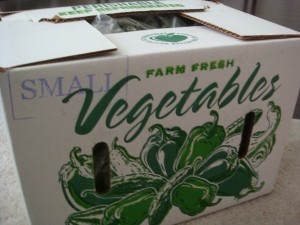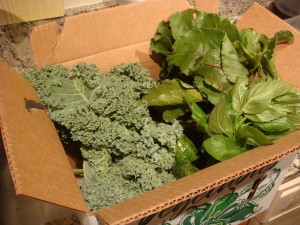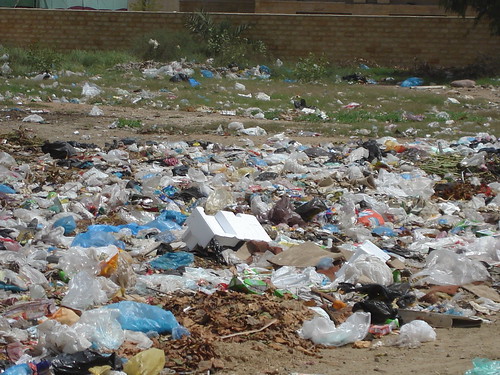Washington DC’s Capital Bikeshare program has been a resounding success since its launch in the fall of last year. There are now 1100 bikes spread out at over 110 stations throughout DC and Arlington, VA. Capital Bikeshare recently announced the addition of 32 new bikeshare stations within the District, and Arlington County is currently reviewing where to put in several new stations along the Rosslyn-Ballston Metro corridor. There are so many ways in which DC’s Bikeshare system has been done right, from the design of the bikes to ease of use for customers that it makes a great example for other US cities to follow. My only wish is that they expand with stations in Shirlington (south Arlington), which will likely be Arlington’s next step after stations are complete in the Arlington Metro corridor. Here’s a video from Streetfilms documenting some of the Bikeshare’s success:
Category Archives: Living Green
Sustainable Eating: The CSA
 Over the past few months my girlfriend and I have been looking for ways to live a more sustainable lifestyle. I decided to forgo buying a car (using a combination of my bicycle and public transportation instead), found new ways to clean around the house using non-toxic ingredients and recycled materials, and now have joined a community-supported agriculture (CSA) program to source part of our food locally. There are all sorts of CSAs out there (meat, dairy, fruit) and various size shares available, depending on the farm, but we chose to keep it simple with a small vegetable share for our first CSA experience.
Over the past few months my girlfriend and I have been looking for ways to live a more sustainable lifestyle. I decided to forgo buying a car (using a combination of my bicycle and public transportation instead), found new ways to clean around the house using non-toxic ingredients and recycled materials, and now have joined a community-supported agriculture (CSA) program to source part of our food locally. There are all sorts of CSAs out there (meat, dairy, fruit) and various size shares available, depending on the farm, but we chose to keep it simple with a small vegetable share for our first CSA experience.
Here are two reasons we joined a CSA and what we’ve enjoyed about it so far:
- Fresh LOCAL Food
We try to eat fresh foods as much as possible, but finding locally-sourced food is a bit more of a challenge. I’ve wanted to join a CSA for many years, but with the move to Japan and being a broke college student before that, it never was a possibility. However, now, for five months of the year we have our vegetables traveling 110 miles from southern Pennsylvania to our table. This isn’t as close as I wanted it to be (we signed up late, so this was the closest CSA I could find with shares still available), but it’s certainly more sustainable than the 1400-mile average that most food travels before it gets to your kitchen. - Trying Out New Foods
Getting a box of in-season vegetables forces us to try out new veggies that we wouldn’t normally have purchased. For example, prior to joining the CSA, the only time I had ever bought a beet was as an accessory to my Dwight Schrute Halloween costume. Sure enough we got a bunch of beets in our first box of veggies, so I got online and found a delicious recipe for roasting beets- we ate every part of the beet!
Every Thursday we pick up our box from our local drop point and it’s always exciting to see what’s inside for the week. We’re looking forward to more fresh, locally grown foods coming our way, maybe adding a fruit share, and we’re hoping to find a CSA for other seasons as well! Has anyone else had any experiences with CSAs? Please leave a comment!

Wonderful Short Animated Film for World Water Day
Yesterday was World Water Day. Freshwater shortages are going to become a serious issue in the near future and have been a problem in California and along the Chattahoochee River in the Georgia, Alabama, and Florida tri-state area. In recognition of World Water Day, Bit Films released The Incident at Tower 37 online yesterday. It’s a unique animated short film that takes a look at the human impacts on ecosystems. The film has won many awards at film festivals throughout the world. Enjoy!
Turn Waste Plastic Into Fuel
Plastic is everywhere. It has found its way into all sorts of products that we use regularly. You can now buy a plastic toy in plastic packaging at the store and they’ll put it into a plastic bag for you. How convenient! But what happens to all that plastic? A plastic bag that goes to a landfill will take 10 to 20 years to degrade. A lot of the plastic doesn’t make it to the trash though, and now we have a garbage pile in the Pacific Ocean estimated to be twice the size of Texas. Yes, that is huge.
Well, now a Japanese inventor by the name of Akinori Ito has created a machine that turns waste plastic back into oil, and with one extra refining step it can be turned into gasoline. Further good news: the machine uses barely any energy. Imagine taking all your plastic waste (shopping bags, wrappers, takeout containers, etc) and turning it into a gallon of gas that you then put into your car. This doesn’t relieve us from our oil dependency, but it would help us keep tons of plastic from contaminating our soils and waterways. It would also let us reuse all the wasted plastic from ‘disposable’ products that are used once and tossed away.

